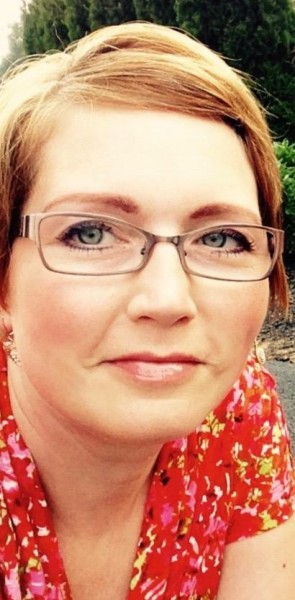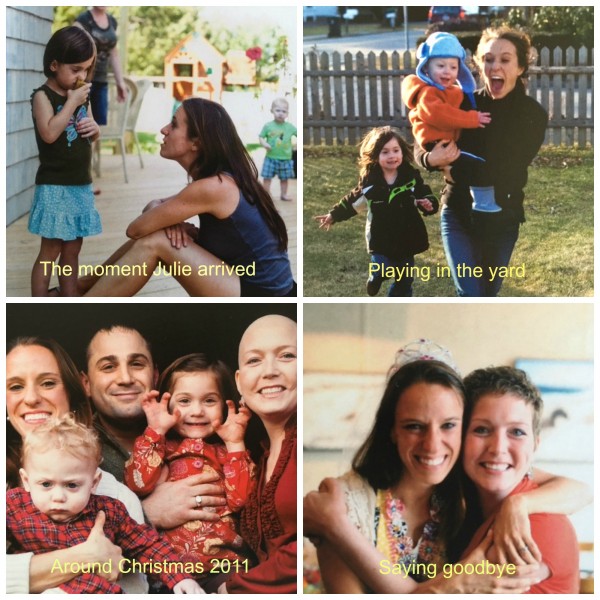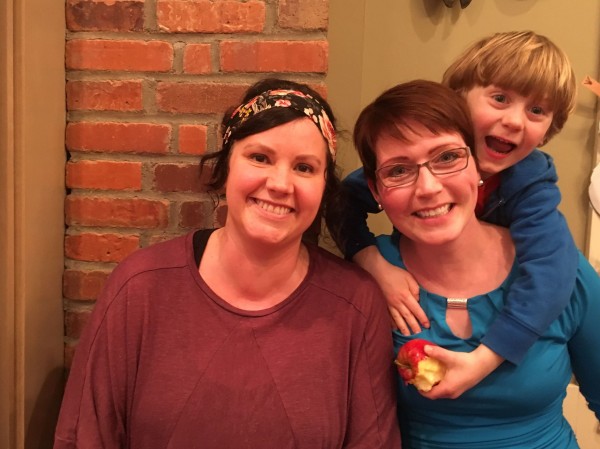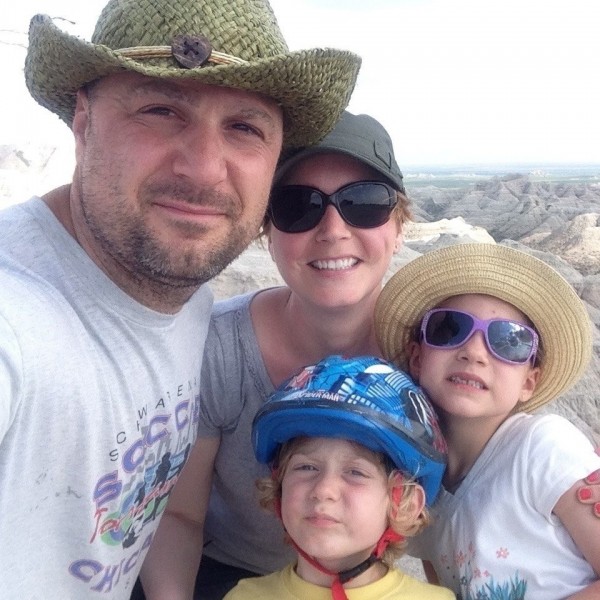 Five years ago, Rebecca Vincelette discovered something unusual in her right breast. It was Father’s Day weekend. She was 33 years old. “I was in the shower and I was doing a breast exam, “she told me over the phone recently. “The tissue felt thicker and more dense. It didn’t feel like a lump, but it felt like something was wrong.”
Five years ago, Rebecca Vincelette discovered something unusual in her right breast. It was Father’s Day weekend. She was 33 years old. “I was in the shower and I was doing a breast exam, “she told me over the phone recently. “The tissue felt thicker and more dense. It didn’t feel like a lump, but it felt like something was wrong.”
What followed was an appointment with her doctor and a cascade of medical tests and procedures — mammogram, ultrasounds, biopsies. Each one brought Rebecca closer to a diagnosis no woman wants to get. One that is unusual for someone so young, but by no means impossible.
Two weeks after she found the lump — just one week before she turned 34, Rebecca was told she had breast cancer. It’s estimated that nearly 250,000 new cases of invasive breast cancer will be diagnosed in 2016. The majority will be women over 45, but the Young Survival Coalition estimates that more than 13,000 will be women under the age of 40.
In Rebecca’s case, cancer cells were spread throughout her breast. They were mainly DCIS — intraductal carcinoma in situ. The cells were confined inside milk ducts. Some experts consider it stage 0 breast cancer. Others call it pre-cancer.
For Rebecca, there were two major problems.
- There was DCIS in many, many ducts AND
- In one of the ducts, the cells had spread outside of its walls.
It was the cells that had spread outside one of the ducts that Rebecca felt as a thickening. “So, I had two things going on,” she emphasized. “I had the ductal carcinoma in situ and I also had a large tumor that was positive for estrogen and progesterone receptors. I knew for sure going into surgery that I was at least a stage two.”
Surgery was a bilateral mastectomy. There was no cancer in her left breast but she didn’t want to take any chances. When she woke up in the recovery room after the surgery, the news wasn’t good. Her cancer was not stage 2. It was stage 3 because not only had it invaded tissue outside the milk duct, it had also spread to nearby lymph nodes.
Life before breast cancer
Let me tell you a little bit about Rebecca’s life just before she discovered the lump.
She had a three-year-old daughter and a one-year-old son and had stopped nursing her son about three months earlier. She was tired but chalked it up to all the changes her body had been going through — pregnancy, birth, breastfeeding and weaning her baby. Plus her life was really busy.
“I remember thinking I shouldn’t still be this tired, “she said. “The baby’s sleeping through the night now. I was super tired, but that wasn’t enough to raise a red flag, to send me in and say I think I may have cancer.”
A friend drops everything
Once it was confirmed that she did have cancer, Rebecca and her husband knew the road ahead of them was probably going to be one of their biggest challenges together. She would need to heal from major surgery, and then go through chemotherapy treatments (which turned out to especially rough), radiation therapy and several years of tamoxifen hormone therapy. They would need a lot of support.
Family, friends and neighbors rallied. One of their closest friends, Julie Halsey, dropped everything and moved in with them for about a year to help take care of the kids and the house. “It was a big ask but it set the tone for that whole year,” said Rebecca. “You really can’t do something like this on your own, especially when there are young kids. We needed help and she was clearly one of the people I trusted most. I entrusted my children to her.”
I asked Julie why she put her life on hold for a year to help Rebecca and her family. “Very rarely in life are you ever in a space where someone asks something that’s very big and you have the ability to say yes and to help,” she answered. “I wasn’t married at the time. I didn’t have kids. I didn’t have a fully permanent job. I thought to myself, this is what you do when somebody asks this of you. Very rarely in life do you have the opportunity to enter into somebody else’s journey in such a profound way that is humbling and growing and challenging. There were definitely trying times but there’s a deep love and trust and intimicy that came from being in that space that I think is priceless.”
Rebecca said of Julie, “I know of no better nor kinder human being in the world!!!”
Searching for other young women with breast cancer
From the beginning, Rebecca yearned to talk with other women who were her age and also had breast cancer. “I was part of a telephone support group for young women when I first came out from my surgery,” she said, “and the first year of my active treatment. It was great. We could all call in and I was in bed, the only place I could be. I used a headset and we would talk for several hours.”
When she was able, she attended a few local breast cancer support groups but was usually the only young woman. She finally met six others at a retreat for women under 40. “In that weekend,” she explained to me, “I realized that part of what I lost when I was diagnosed with breast cancer at 33 was my peer group. I had wonderful friends, but I didn’t have anyone I could share my cancer experience with and talk about things like hot flashes. Because who at
Three years ago, she met Ryann Chamberlain, the same age, facing some of the same challenges, and also from Maine. “The first time we met we talked for like three and a half hours straight — laughing and crying. And we both walked away thinking oh my word, there’s someone else who gets this.”
They stayed in touch but also hoped to connect with other women in the area. One day, Rebecca was doing some online research and came across a network of support groups called Face2Face developed by the Young Survival Coalition. But there wasn’t a group in Maine.
She decided to start a Maine group and Ryann was immediately on board. They contacted the Cancer Community Center in South Portland and got a thumbs up on hosting monthly meetings there. And just like that, there is now a Face2Face support group for young women with breast cancer in Maine. Hosted by Rebecca and Ryann.
Here are some details about the group:
Face2Face (F2F) networks are peer-led social networking groups for young women affected by breast cancer. All young women who have been diagnosed with breast cancer at all stages of treatment, recovery and beyond are welcome.
This network is designed for breast cancer survivors diagnosed in their 40s or younger regardless of current age. Whether you have just been diagnosed, are still undergoing treatment or are several years out, join the group to connect with others. Learn about available resources, ask questions, make new friends and be assured that you are not alone. F2F is offered in partnership with Young Survival Coalition.
Face2Face
Cancer Community Center
778 Main Street
South Portland, ME
The first meeting was Saturday, May 21 from 2:00 pm to 4:00 pm. Going forward, meetings will be the third Saturday of every month. For more information, contact the Cancer Community Center.
Five years have passed since Rebecca’s life turned upside down. She still has side effects from her treatments, but tests show that today she is cancer-free.




This story is very informative & like other stories Iv herd over the years.My question is if you have dense breast/Lumpy or If your doctor tells you that you have a sist should I idiomatically have a biopsy no matter what?Iv had a few mamms & ultra sound on the sist and it comes out negative.But Im just torn because the lump is there & Im considered lumpy breast anyway so Im not sure if I should get a second opinion or just go with what my doc says and every mamm always comes out normal.Is there a such thing as a normal sist turning bad?Thanks,Wendy 🙂
Wendy, I think if your gut is telling you to get a second opinion, that’s what you should do.
Thank you for your reply,I probably will get a second opinion.